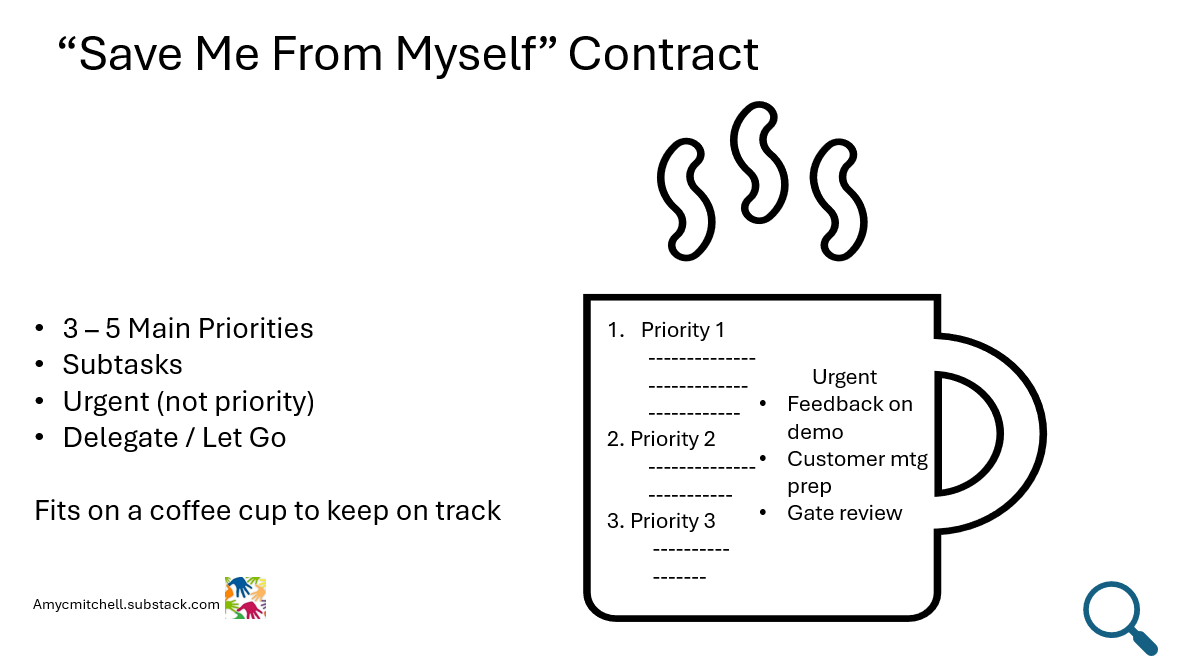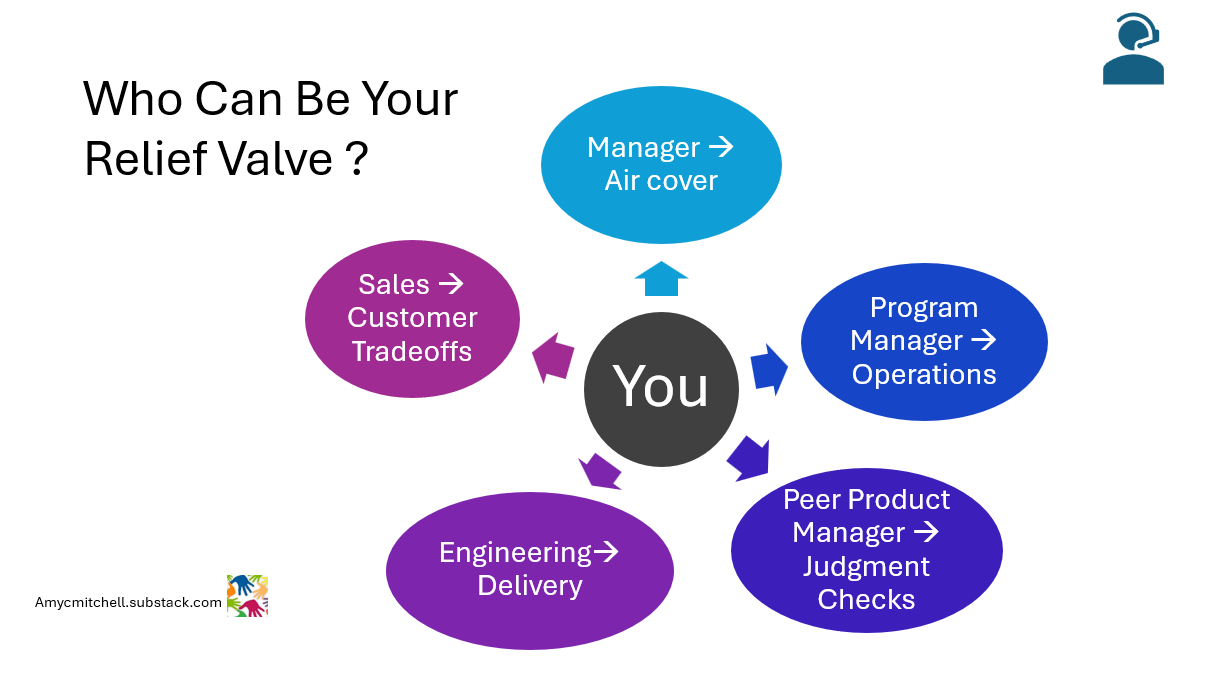The Hidden Tax of Being the 'Reliable' Product Manager
How being the go-to person can cost you your focus—and what to do instead
Are you known for being dependable?
You've probably heard: "We can always count on you."
At first, it feels like praise. You're trusted. You’re the one who keeps things on track.
But over time, things shift.
You jump in before being asked. You anticipate problems before they appear. You pick up the slack because it’s faster, cleaner, or safer if you just handle it.
Why? Because you're reliable. Because you can do it all.
That strength has a cost:
The over-responsibility
The creeping sense that if you don’t do it, no one will
That’s the hidden tax of being the product manager who can always be counted on.
It won’t show up in your roadmap or your performance review.
But it takes your energy, focus, and long-term impact.
This article covers:
The hidden costs that dependable product managers face when they over-carry
Strategies to stay reliable without absorbing everything
How to know when your strength helps—and when it hurts
Let’s dive into how to stay dependable and focused.
Five Hidden Costs of Over-Responsibility
Cross-functional teams rely on proactive product managers. Sometimes, that initiative turns into habits. For example, fixing problems before they escalate or doing quiet cleanup no one sees.
But when these habits become your default, the cost adds up:
Hidden Cost #1: You say yes before thinking
Emotional trigger: You want to be helpful. A quick response protects trust.
Practical cost: Your own priorities get disrupted. Focus gets fragmented.
How to spot it: You’re always behind on your own work.
Hidden Cost #2: You anticipate problems too early
Emotional trigger: You want to prevent issues before they escalate.
Practical cost: You burn time on problems that might never happen.
How to spot it: You’re procrastinating on strategic work to be the team’s safety net.
Hidden Cost #3: You avoid delegation
Emotional trigger: “They’re too busy” or “They don’t get how important this is.”
Practical cost: The team doesn’t grow. Experts don’t get better.
How to spot it: You spend nights learning someone else’s job.
Hidden Cost #4: You silently smooth over team gaps
Emotional trigger: “I see the gap. It’s easier if I just fix it.”
Practical cost: You spend mental energy on others' responsibilities.
How to spot it: You’ve become the team’s living knowledge base.
Hidden Cost #5: You snap when others don’t carry their weight
Emotional trigger: “Why am I the only one fixing this—again?”
Practical cost: Your time goes to fixing preventable mistakes. You lose patience.
How to spot it: Resentment. Grumbling. Policing others’ work.
These costs often start as small emotional triggers. Over time, they snowball into reactive habits. If your to-do list reflects everyone else's problems—and none of your priorities—it’s a sign your reliability is working against you.
Three Strategies to Use Your Strength More Effectively
You’ve built your reputation by going the extra mile. You don’t want to become the product manager who stops helping the team.
But being dependable doesn't mean doing everything.
Here’s how to stay reliable—without over-functioning.
Strategy 1: Redraw Your Job in Plain Sight
Give yourself permission to walk away from the extra work you’ve absorbed. Clarify what you own—and what you don’t.
Many dependable product managers take on “bonus work” triggered by emotion: helping because it feels right, not because it’s right for focus.
Create a personal contract that makes your boundaries visible to you. Think of it as a daily compass to protect your time and attention.
Your personal contract should fit on a coffee cup:
List 3–5 top priorities tied to your performance goals
Add 4–6 sub-tasks under each
Create a second list for urgent but off-mission asks
This becomes your “save me from myself” tool. Use it to refocus when your instincts push you to jump in.
Do-it-yourself Guide to make your “Save Me From Myself” contract (paid subscribers only)
Strategy 2: Say “Not Me First” Instead of “Not Me Ever”
You don’t need to stop being responsive. You just need to shift the timing.
When something pops up, your reflex is to answer first. That responsiveness is part of your brand. But it comes at the cost of focus.
Try this instead: pause and let others go first.
Then only step in if it’s urgent or aligned with your priorities.
Use this “Not Me First” filter:
Is it urgent?
Customer pain now?
Cost of delay?
Others available to respond?
Do I need to answer?
If not, step back and observe.
If yes, schedule the response to protect flow.
If it’s not yours, let it float.
If you care, note it.
If you don’t, trust the team or let it go.
This habit reinforces your boundaries without damaging your credibility.
Saying "Not me first" protects your dependability and your brain power.
Strategy 3: Build a Relief Valve System
Even the strongest product managers hit pressure points. That’s why you need a relief valve: a person or process that helps you step back before your inner turmoil spills out.
Relief valves aren’t backup plans—they’re proactive partnerships.
A good relief valve has:
Knowledge: overlaps with your domain
Buy-in: agrees with the work strategy
History: understands your context
Ability: can step in without a ramp
Some relief valves:
Your manager – for resets and air cover
Program managers – for ops handoffs
Peer product managers – for judgment calls and scope
Engineers – for delivery triage
Sales – for customer tradeoffs
These aren’t formal roles—they’re trusted people. Your job is to prepare them before you need them.
Conclusion: Being Dependable and Focused
Being reliable is a strength. But it’s also a system you have to manage.
You don’t have to fix everything to be valuable. The goal is dependability with focus, not dependability at the cost of clarity.
Here are the tools to stay strong without carrying it all:
A personal contract to prioritize what only you can do
A “Not Me First” mindset to protect your time
A relief valve system to release pressure early
Sharing the reliability load might be the most creative leadership move you make this year.
Real strength isn’t doing it all.
It’s knowing when to let others carry the load with you.
Looking for more practical tips to improve your product management skills?
Check out Product Management Resources for free product management templates and guides.
Become a paid subscriber and get more weekly tips. Last week, paid subscribers learned about building general manager skills. How Many Blind Spots Can You Find?
Paid subscribers get access to 3 learning paths, 5 templates and 7 quick start guides. The newest learning path helps you develop standard offers.🎁
TLDR Product listed Product Management IRL articles recently! This biweekly email provides a consolidated list of recent product management articles.
Connect with Amy on LinkedIn, Threads, Instagram, and Bluesky for product management insights daily.












Great read, thank you, Amy! I often find myself struggling to be the best version of myself and the most reliable person. It quickly turns into a rat race, and I have to remind myself to take care not to burn out.
You anticipate problems too early - That is exactly what prevented me from founding a own company. I always play the advocatus diaboli...
Thanks for the article Amy!